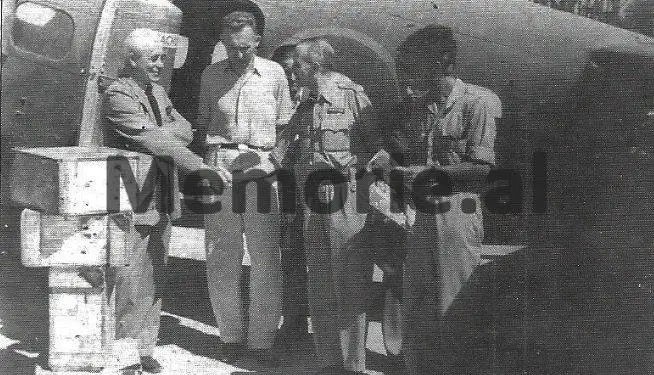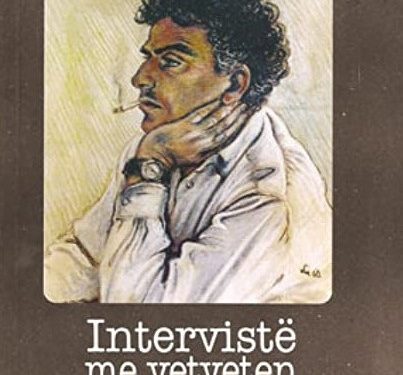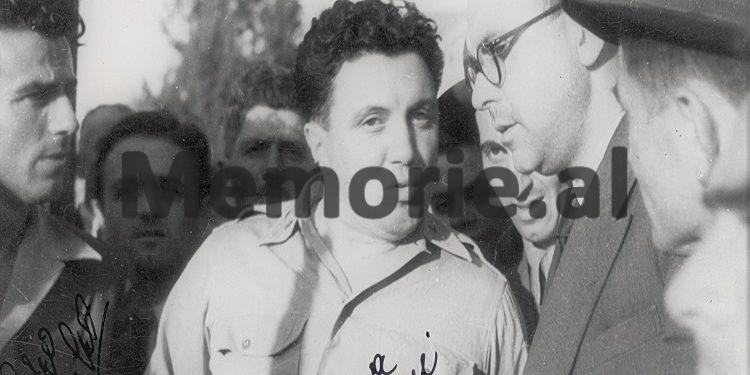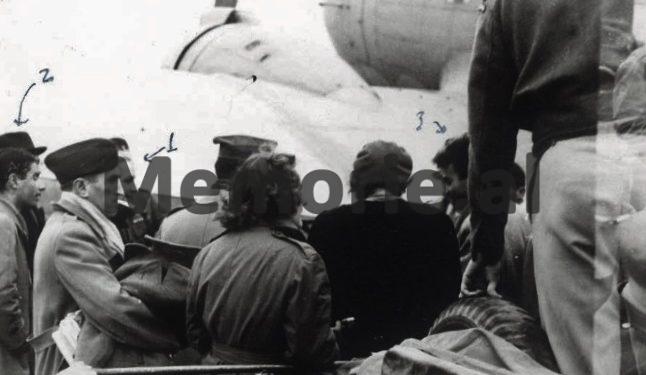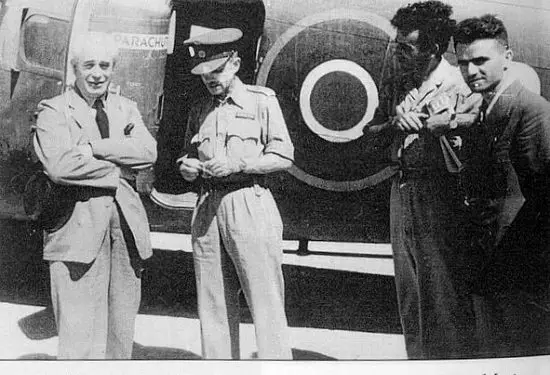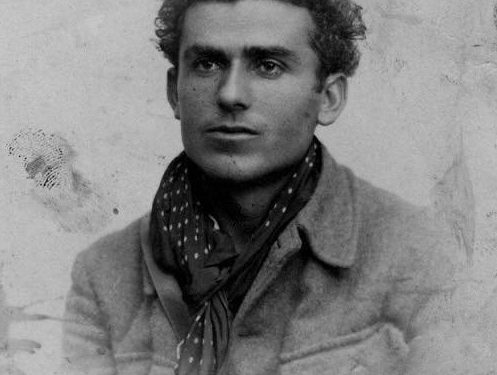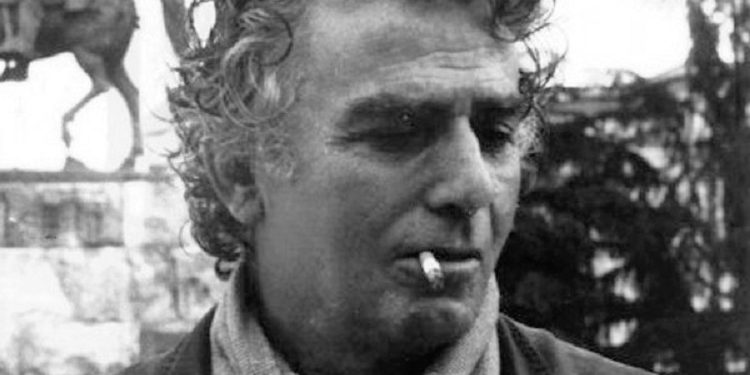Second part
Memorie.al / Confessions of the writer Petro Marko, former fighter of the Internationalist Brigades in the War of Spain and Tirana, tells the backstage of the War and why Koçi Xoxe hated Enver?! Sejfulla Maleshova’s order: “This is a terrorist party, don’t open your mouth, because you will suffer…”! Selected parts from the book “Interview with myself”, by the well-known Albanian writer Petro Marko.
“Self-Interview”
The author Petro Marko appears during the narration of his story in “Self-Interview” as a mythological creature, born to hold the sword raised and ready to strike evil wherever it is, convinced that this is how he cleanses the sky native land. With this great faith, Petro Marko, after years of continuous battles in Europe, in 1944, will return to Albania. At the age of 30, but with so many achievements on his back, that in the life of an ordinary man they cannot be loaded even for a century, Petro Marko, as long as he was alive, will experience the greatest disappointment and pain in his homeland.
The first days in Tirana, after appointing him as press officer, they assigned him the house where he would live. Late in the evening, on the first night, he will witness a sad meeting with the family and the owner of the villa: “Comrade Petro, they have given us an order to release the house to you with everything in it, where will we settle and can let’s take something personal with us”, the lady of the house waits for him, trembling. Petroja gets sad, leaves the house and asks for clarification from her friends – isn’t it a mistake or a misunderstanding?
This is how he begins his narrative in the voluminous work “Interview with himself”, which is one of the most chilling testimonies about what would come and grip Albania during the Communist dictatorship. They will also force Petro Marko to come under the tutelage of the “Borba” newspaper in Belgrade. But he does not accept: “We have more tradition, we are the successors of the newspaper “Bashkimi i Kombit” before the war, let “Borba “learn from us” and this is where the new ordeal of imprisonments and persecutions of a savage will begin had not tried it before.
A fellow soldier from Italy, after nearly 50 years, sometime before his death, will say to Petros: “Write your way, your story because it is worth more than 100 novels”. And indeed, the book “Interview with me” is the history of Albania for half a century. The drama of the nation is better known through this work.
Continues from last issue
Question: How did the events unfold?
Answer: I begged Koç and Mehmet to allow me to go to the First Brigade, because I wanted to participate in our war, as I had dreamed. They accepted my request. In Tirana, of those I brought from Italy, they only kept Nexhmedini Zajmi, as a painter. The others were included in the 6th and 7th Brigades and most of them were killed in the lands of Yugoslavia, following the Germans all the way to Sanjak.
I was kept in Shkodër to publish the Bulletin of the Third Corps. I slept at Nush Topalli’s house, where I received the news on the radio and prepared the subject for “Jeta e re”, where Vehbi Bala and others collaborated. Shkodra was in a big celebration. There is no city in Albania that has welcomed the partisans as well as Shkodra. Every family had the honor of keeping a partisan with all the good things.
The family of Nush Topalli kept me as their son, many generous, patriotic and noble families. But in Shkodër, apparently with the influence of the Montenegrins, the persecution against the Catholics began. Many people from Podgorica had come and they were almost the majority. The looting of goods, the emptying of shops by the Yugoslavs began. The people of Shkodran were terrified and were waiting for the Albanian government to do something: would it stop the Slavs from stealing goods, emptying the shops?
Question: Why do the Yugoslavs empty the shops and warehouses of Shkodra?
Answer: I will tell the truth: the judgment of each action should be done according to the time when it was performed. We, as anti-fascists and internationalists, were very legal, very honest and regarding the actions of the Yugoslavs, although they harassed us with many doubts and question marks, we did not express that we believed very much in the common ideal. It never occurred to us that a left-wing party could act mischievously. I was told by some friends from Shkodra, Catholics and Muslims: “The Druze is robbing us and we are doing them a favor”!
I want to note here also a conversation I had after a year with Nako Spiru, Minister of Economy: “We have so many goods and materials of every category that for 10 years we don’t need to import anything”, he told me. Even Nush Topalli, a wise and honest man, one evening, eating bread in his house, timidly asked me:
I’m sorry, Mr. Petro. I know you are an honest patriot, and I want to ask you a question do you allow me
I eat the bread of an Albanian brother, – I answered, – how can I not trust and respect him? What do you want to tell me?
He asked me:
Why Mr. Petro, the Slavs are stripping us? At least they take a part and we keep a part, where can we find all these goods of every category: from building materials, to manufactures, to machines, to drinks, even to the brushes of the needy?! I’m sorry, really a friend is a friend, but we should give him what he wants and not open warehouses, warehouses, shops… and empty them without even saying thank you! I understand that Mr. Petro. I see everything and keep silent, because I opened my mouth; the prison is waiting for me…!
I did not understand this extortionate action without scruples on the part of the Druze…!
All Catholics were looked down upon, even their arrest began.
Question: What do you remember from Shkodra?
Answer: The best memories, but also the deepest sorrows. Hysni Kapoja, my friend and enemy since childhood, had come to Shkodër in those days. He was a commissar of Korpamata III. I wanted to report what I saw in Shkodër, but I remembered the words of Sejfulla Malëshova in Berat: “Listen and see, but don’t open your mouth for a year”. That night, a Kosovar dentist called me for dinner. I asked a friend who was from Security, and he told me I could go.
When I went to the doctor’s family, I saw Babushi- Bedri Pejani there like a ghost; it seemed to me as if you were in a dream. He hugged me with tears in his eyes. We missed each other, because we hadn’t seen each other since Paris, in 1939. We sat up all night without sleeping, because he was telling me incredible things: the great Serbian terror in Kosovo and Metohija, the atrocities and Hitler-style crimes committed by Ranković and Mihailovči . I was very surprised at those inhumane deeds.
And he told me how the Albanian Communist Party was created by Tito’s agents, Dushan and Miladini. Babush had to organize the Second League of Prizren and agree to become prefect of Peja, justifying himself with the statement of Hasan Prishtina: “Even with the devil I will become a common ally, only Kosovo will be freed and unite with mother Albania …”!
In the morning I would leave for Tirana with Hysniu, because he had come to take me to publish the newspaper “BASHKIMI”…! I opposed them, but he, as a dear friend, convinced me by telling me that I was a journalist and his friends had asked him to take me with him. I told him that I had an old friend, Beezer, about whom I spoke a lot. He told me to take him with us to Tirana. And all along the Shkodër-Tirana road, Geezer talked about the situation in Kosovo and about our betrayal of Kosovars.
When we arrived in Tirana, Hysniu said to Geezer: “All these things you told us, I wrote them down and gave them to Petros”. And we parted. The geezer was drilled in the house of Abdurrahman, his son-in-law. They welcomed him surprised and very excited. After a week, Geezer sent me a “Memory” with his daughter, where he wrote what he had told us during the Shkodër-Tirana trip. There were 13 typed pages. I copied them. I kept the copy; I sent the original to Hysni.
I can’t find the copy, because I was raided twice by the State Security: the first time when I was arrested and the second time when the boy was arrested. They didn’t leave me manuscripts, poems, novels, letters, old newspapers, etc. without taking them. But I will try to tell the essence of what Beezer told us, from Shkodra to Tirana, which he summarized in the memorandum that I handed over to Hysni Kapo.
“…You have committed a fatal crime not only for Kosovo, but also for all of Albania. Night in Tito’s trap. You put an end to him with the Miladins, with Vukmanovic Tempot, and especially with the leadership of your Party led by the Serbs our independence. If the great allies do not give up, there is no more Albania, but an obedient daughter of Tito’s Federation. Tito filled Stalin’s mind not to accept Dimitrov’s idea of creating a Balkan Socialist Federation where, where Serbian was spoken, it was the Serbian Republic, where Albanian was spoken, it was called the Albanian Republic, where Bulgarian was spoken, the Bulgarian Republic and so on for all the peoples of the Balkans, because the Balkans lived for nearly 500 years under the same Ottoman rule, with the same canons and customs.
The peoples of the Balkans cannot be divided strictly by borders, because they have moved during five centuries, making the Balkans a place where you can find only one people within a border. But Marshal Tito did not like this idea, even Stalin, that if the Balkans became a socialist federation, it would far surpass the backward Soviet Union, so Stalin did not want to be the despot of a backward people.
Even the Anglo-American politicians did not support this opinion of Dimitrov. During the Second World War, they raised two figures: in the west, De Gaulle, and in the east, Marshal Tito, who claimed to become the marshal of the entire Balkans, according to the wishes of Çurçulli, whose son stood by Tito during the War. But Tito could not become the Marshal of the whole Balkans, but he became the Marshal of Albania.
The truth is that Stalin had told him to include Albania as the seventh Republic, but the clever Tito refused, saying that Albanians are not Slavs and that… they are jealous of their independence. He said that, if Albania was united as the seventh republic, it would be the largest, richest, strongest republic, because Kosovo would also be united in this seventh republic.
Geezer claimed that he agreed with Dimitrov’s idea, but after seeing how Tito acted with his agents in Albania, he was more than sure that Albania already belonged to Tito. The tragedy of Kosovo – said Beezer – was caused by us, because we were servile, cowardly and loyal servants of Tito, who had here his famous agents, Miladin and Dushan, who created a party according to their plans.
“Today we are ashamed to say that a nation of smart and patriotic people fell on their knees to a Miladini, who created the Party as Tito himself wanted it. We tried and created the Second League of Prizren, they appointed me as the chairman. I also became the prefect of Peja. Even the desolate Emrush Myftari, a brave warrior in Spain, created a detachment to protect the Albanian people from the Serbs and Chetniks.
He even came to Albania, with a bag full of hands and severed heads of small Albanian children, brought them to Tirana and, at Esat Dishnica’s house, called Enver Hoxha and Nako Spiru, emptied the bag of heads and hands of Kosovar children and said: “This is what your Druze do, that you hold in your arms”! Then Emrushi went to Tirana, saw two Chetnik leaders, followed them and killed them both in front of the National Bank”.
I remember that at the end of the memorandum he said: “Open your eyes and peel Tito’s puppies, otherwise there is neither Albania nor Kosovo!
Question: And then what happened to Beezer?
Answer: After some time, Geezer was handed over to the Yugoslavs, who imprisoned him. He wrote two letters: one to Dimitrov, the other to Kolarov. Before their answer came, the jailers poisoned him. This was the end of one of the most prominent sons of Kosovo and Albania, the friend of Fan Nol, of Hasan Pristina, of Bajram Curri and of all Albanian revolutionaries and patriots.
Question: They say that during his life there are many curls! Do you know any of them?
Answer: It was the devil himself. Fan Noli took him by the neck with two lines that he wove in the parliament: “Popullorja brigje-brigje/, Burn, o Bedri Peja, burn.”With Noli, they had a lot of humor and banter. Babushi told how one day, when he went to shave in Berlin, he entered the barbershop, which was divided into small rooms and where each customer entered a room. Geezer also entered a room and the barber closed the door. Then, as soon as the Beezer sat on the throne, the barber stepped on a spring and the Geezer’s throne overturned, a large niche opened under it into which the Geezer would fall, but the Geezer immediately opened his hands and feet, called out loudly many times , until the gate opened and they came and lifted him up.
Geezer miraculously escaped, because that barbershop was a slaughterhouse, where customers turned them upside down, took their money and what they had and didn’t have, and those who were fat like Geezer, butchered them and made mortadel. When Geezeri told Noli this, Noli and the other friends who were there burst out laughing, and then Noli said: “We would have eaten like mortadella!”
Question: When you came to Tirana, where did you settle?
Answer: I went to “Dajti” hotel, where I found many friends. I settled there, like all the other friends; paid by the Ministry of Culture. The next day, I went to the staff members, where I also found Koçi. Enveri told me that: “The newspaper “Bashkimi” must be published as soon as possible, that’s why we called you to come.”
I accepted on one condition: I asked that my friends Enver Hoxha, Sejfulla Malëshova, Omer Nishani, Nako Spiru, Ymer Dishnica give me one article each, once a week. I would do the rest myself. They told me to take whoever I wanted and ask for anything, just to get the paper out as soon as possible! “Within these days”! – I told them and started work. I asked Rebbe Alikajn and went to the printing house “Bashkimi”.
There I found the zincographer Nejdhet Kosturi and I told him that we had to publish the newspaper “Bashkimi” as soon as possible, which we approved and then immediately he printed it. In his zincography, I put a radio that I got from Shkodra, from the warehouses that the Yugoslavs were emptying. Before the New Year, I started publishing the Union. I had Nuçi the desert priest as a correctional officer, who died after some time.
I also called Reshat Again, whom I had known since my youth, to take the news for me as a good stenographer that he was: little by little, other friends who cooperated were coming, like Remzi Xheneti and others who came and went, like: Kole Jokova, Mark Gurakuqi, Vebi Bala, Jusuf Alibali, Enver Fico, but they did not stay. Fortunately, the typographers were Italian, the layout Italian and that of the rotary Italian.
They worked hard, carefully with quality, that’s why I also provided myself with a liter of milk every morning and on Saturdays, as soon as the newspaper was thrown on the flan; I had assigned 200 francs for them to spread as much as they wanted.
I was looking for an office. I was told to go into a nearby building, but I went and chose a good building on the boulevard where the Italians had their ironworks offices. I took the second floor until they left, then I would take the other floors. New publicists came to my newspaper, such as: Astrit Delvina, Mustafa Greblleshi, and Osman Bishqemi, whom I activated as reporters and they were good. Later, Mustafa Xhaxhiu and Raif Hasani came.
Question: Can you describe the situation in the days, months, years before the liberation?
Answer: Almost 47 years have passed since then, but I had the opportunity, as a journalist, to write as much as I could about that situation and these remained in the timeline, which recorded the newspaper articles. I, in the evenings, when the newspaper was almost filled with material, on the spot, wrote my column “An hour in Tirana”.
I would capture an event of the day and, writing there next to the linotype, would give it piece by piece to the linotype. The truth is that after the liberation, Tirana had plenty: to eat, to drink, and to wear was like never before. Private trade competed. In an article published in “Bashkimi”, Sejfulla Malëshova wrote well: “We should be grateful to our merchants, who, at the risk of their heads, crossed the Adriatic with steamers full of goods, which filled Albania.
They risked their heads, because Allied submarines were everywhere and when Italian ships went, they torpedoed and sank them. Instead of thanking you, – Sejfullai wrote, – we condemn them as capitalists, kulaks, speculators or imprison them and take their property. Take for example a merchant from Durrës, Vangjel Manushin, who also brings potatoes from Korça with a cart, while we, as the government, who have all those vehicles, are not happy to supply the people”. Memorie.al
The next issue follows




